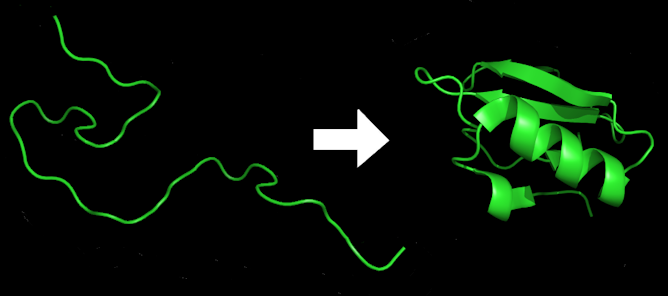|
AI technology that enabled a computer to defeat chess grandmasters has now been employed to help biologists in an arguably more complex task: predicting how a protein folds – a problem that has eluded them for 50 years.
Proteins are the workhorses of the cell and regulate all the ongoing chemistry and communication in living organisms. Consisting of thousands of atoms, they have a complex three-dimensional structure that is essential for performing their function. If the protein has the wrong shape, it can’t do its job. And that can cause disease or even death.
But with the assistance of DeepMind, researchers believe they can now accurately predict a protein’s shape. Marc Zimmer, a professor of chemistry at Connecticut College, explains how this could have profound implications for creating new drugs and understanding diseases as disparate as Alzheimer’s and cystic fibrosis.
Also today:
|

A simple chain of amino acids folds into a complex three-dimensional structure.
Marc Zimmer, Connecticut College
Scientists in an artificial intelligence lab have made a breakthrough in solving the problem of how proteins fold into their final three-dimensional shape. The work could speed up creation of drugs.
|
Health
|
-
Sarah Hillyer, University of Tennessee; Carolyn Spellings, University of Tennessee
The human rights of disabled people around the globe can be accessed as an online map for sports and competition.
-
Lisa Hardy, Northern Arizona University; Gwendolyn Saul, Northern Arizona University; Kerry F. Thompson, Northern Arizona University
Portrayals of Native Americans and COVID-19 often ignore responses rooted in tribal sovereignty.
|
|
Arts + Culture
|
-
Nicole S Maskiell, University of South Carolina
US monuments and memorials have overlooked frontline workers and people of color affected by past epidemics. Will we repeat history?
|
|
Politics/Election '20
|
-
Robert Kozinets, USC Annenberg School for Communication and Journalism
An analysis of social media commentary about socialism versus capitalism shows that people are talking past each other, but some are engaging in more nuanced discussions as well.
|
|
Ethics + Religion
|
-
Kate Padgett Walsh, Iowa State University
President-elect Joe Biden promised to forgive some part of student debt. An ethicist considers what's fair.
-
Brian Grodsky, University of Maryland, Baltimore County
Tens of thousands of people have defied bans on gatherings to protest abortion restrictions. A scholar of democracy says the policy push during a pandemic has echoes elsewhere.
|
|
Video
|
-
Emily Godbey, Iowa State University
Although memorials to past pandemics are not as prolific as war memorials, they do exist. A scholar of visual culture provides a brief history of monuments around the world.
|
|
Trending on site
|
-
Eugene Y. Chan, Purdue University
Here's how governments can get more people to follow COVID-19 guidelines.
-
Zachary Brewster, Wayne State University
It's long been known that Black patrons of bars and restaurants tend to get worse service than white customers. What's not been well understood is precisely why.
-
Margot Gage Witvliet, Lamar University
Margot Gage Witvliet went from being healthy and active to fearing she was dying almost overnight. An epidemiologist, she dug into the research to understand what's happening to long-haulers like her.
|
|